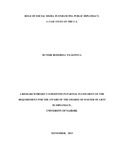| dc.contributor.author | Rutere, Rosebell N | |
| dc.date.accessioned | 2013-11-18T08:50:02Z | |
| dc.date.available | 2013-11-18T08:50:02Z | |
| dc.date.issued | 2013 | |
| dc.identifier.citation | Master Of Arts In Diplomacy, University Of Nairobi, 2013. | en |
| dc.identifier.uri | http://erepository.uonbi.ac.ke:8080/xmlui/handle/123456789/59226 | |
| dc.description.abstract | The wide spread diffusion of the internet, mobile communication, digital media and a
variety of social software tools throughout the world has transformed the
communication system into interactive horizontal networks that connect the local and
global. New form of social media cater to the flow of messages from many to many.
They have provided alternative mediums for citizens communication and participatory
pluralism. In my view diplomats are very good at reserving the traditions of their
profession . Unfortunately despite changes of huge significance to diplomacy that have
taken place in recent years the mechanisms of traditional diplomacy have barely begun
to adjust. The cold war has gone out of diplomacy, but in many cases diplomatic
behaviour remains loyal to it. This include among other things thinking only in terms of
power equilibrium. Methods of diplomacy are still strongly influenced by military
thinking. To become an efficient tool of good global governance diplomacy needs first to
overcome the stereotypes of ideology and military confrontation. It’s task today is to
search not for the balance of power but for the balance of interest. A partial and
balancing approach is an answer to the new geopolitical and economic realities. The
objectives of this study were to establish the importance of digital media as part of public
diplomacy, to determine the extent to which technology can be incorporated into the
practice of state craft, to show that social media as a tool of public diplomacy can be
used to support foreign policy goals. To explore the paradigmatic shifts caused by
social media and finally to identify how cultural diplomacy can be incorporated in public
diplomacy. The researcher noted there is a big relation between the theory of Agenda
setting and the role of media. Public diplomacy goals of winning the hearts and minds
of people need a powerful and well planned agenda in order to reach it’s targets.
Therefore, setting the Agenda that suits the target audience who receives the message is
one of the pillars the media practitioner should put in place. The researcher did a
desktop research where she collected a lot of information from secondary data. The
findings were that new media tools have substantially changed diplomacy and therefore
diplomatic practitioners should be techno- savvy. The conclusion made was that social
media is a vital tool in post –modern diplomacy. The researcher recommended that
governments should expand internet connectivity throughout the world. The research
also recommends that government should stem the negative use of social media and
promote its positive function for protest organizers | en |
| dc.language.iso | en | en |
| dc.publisher | University of Nairobi | en |
| dc.title | Role of Social Media in Enhancing Public Diplomacy: a Case Study of the U.s. | en |
| dc.type | Thesis | en |
| local.publisher | College of Humanities and Social Sciences | en |

